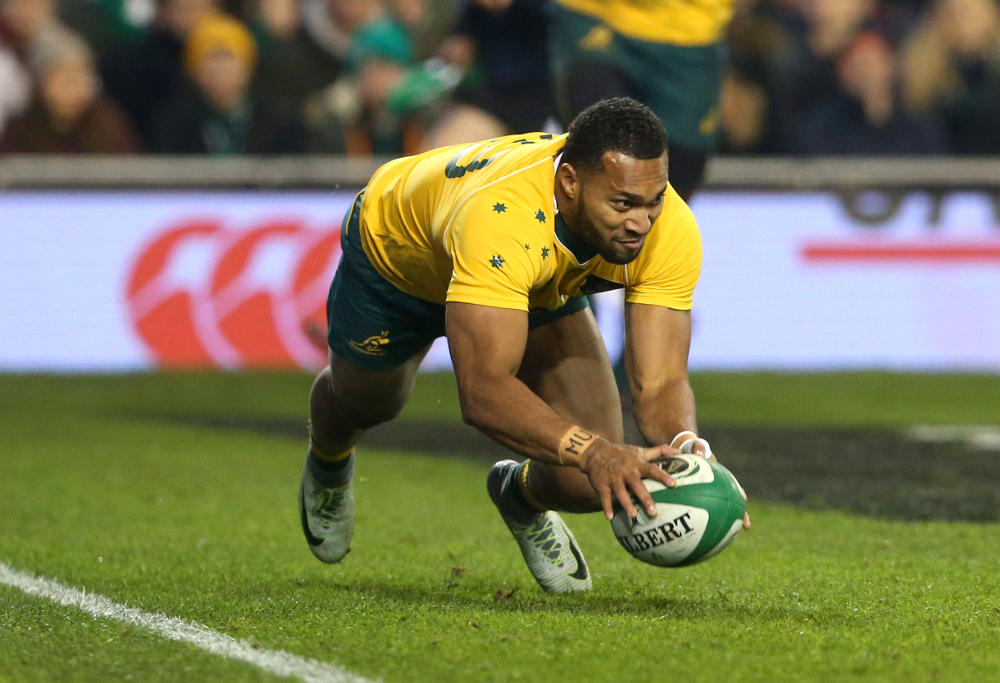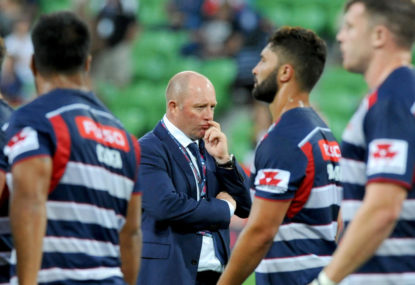Does Melbourne Rebels owner Andrew Cox believe he can become Super Rugby’s Billy Beane?
That’s just about the only way I can digest his assertion that the ARU must open Australia’s borders so he can fill his franchise with foreigners.
Bill Pulver wants to make Australian rugby great again; Cox wants to start filling up the Rebels’ trophy cabinet.
It seems a bit rich given that the ARU’s rule – that Australia’s five Super Rugby teams are allowed to sign two foreign players to their squads – was in place well before Cox took the financially-strained club into private hands in 2015.
It’s a bit like the couple that buy the inner-city terrace a few doors down from the gritty pub that’s hosted live music for years and then proceed to whinge when they move in that it’s too loud.
It’s particularly odd given the rule has been relaxed for the Rebels and Western Force, who have both been given foreign player exemptions because they’ve struggled to consistently match it with the competition’s top end since their inceptions.
In the Super Rugby era, there’s always been an element of player market manipulation given one of the ARU’s chief objectives is to produce a top-shelf Wallabies outfit.
[latest_videos_strip category=”rugby” name=”Rugby”]
Nonetheless, Cox made a significant investment via Imperium Sports Management almost two years ago and he deserves the opportunity to campaign for structural changes. His proposition is arguably incongruous to the goals of the ARU, although he argues that more competitive teams will grow rugby participation “which ultimately is what everyone wants”.
So Cox believes the ARU are pulling the handbrake on franchises by severely limiting how many overseas players can be part of their squads.
“We need five teams in Australia but there shouldn’t be limits on who you can employ. We are a professional competition that is supposed to be delivering for our fans and members,” Cox said three weeks ago.
“If that means we have 50 per cent of our guys from overseas, then so be it.”
Let’s put aside the debate about what the foreign player quota should be and for now try to imagine the hypothetical in which Cox got his way: the Rebels have got a $5 million salary cap to spend amongst about 37 players in their squad, with up to half of those allowed to be foreign players.
Is his argument a red herring, designed to distract from the Rebels’ flops? They’ve finished between 10th and 15th in their six seasons since 2011. They’re winless this season, including a couple of beltings in the opening two rounds.
Or is there some legitimacy to his argument?
Where does his recruitment team look?
Let’s stay close to home. New Zealand? Who are the players putting up their hands there? Well not current All Blacks, who as it stands automatically become ineligible for the national team if they play outside New Zealand. It’s fair to say that the lure of snaring an All Blacks jersey would keep another 40 of the next-best players anchored in New Zealand.
Perhaps the type of acquisition that could prove fruitful would be a player like Jason Woodward. The fullback and winger couldn’t get a contract with any of the five Kiwi Super Rugby franchises, so moved to the Rebels in 2013.
He was brilliant for two seasons before he felt he’d pushed himself into contention to chase his All Blacks dream and returned home with the Hurricanes.
Anyone else in New Zealand? Perhaps Cox would be hoping to lure a big-name ex-All Black as a marquee signing. Spend big on someone who’s content to move on after racking up 60-plus Tests for the ABs. Dan Carter? Conrad Smith? Ma’a Nonu?
Crowds, memberships, sponsorships would surge, right? They’d win games and young Aussie players would get plenty out of it. But in reality, there’s no way the Rebels can compete with the money in Europe. It’s not going to happen. Carter’s 1.65 million euros a season would almost take up half of the Rebels’ salary cap.
Someone like four-Test All Blacks halfback Alby Mathewson gave the Force a fair bit of spark for a few seasons, but is he the calibre of foreigner that Cox is searching for? Maybe.
What about raiding South Africa’s ranks?
SA Rugby recently implemented their own version of ‘Giteau’s Law’, meaning the Springboks selectors can only select overseas-based players who have more than 30 international caps.
Like the ARU did for the Wallabies, the policy is aimed at protecting the domestic game. However, the mass exodus has been to Europe and Japan in recent years. The Rebels wouldn’t be able to compete financially for the top echelon of Springboks – players of the ilk of Bryan Habana, Willie Le Roux, Ruan Pienaar, Francois Louw, Bismarck du Plessis and Duane Vermeulen.
Jacques Potgieter at the Waratahs was a very astute signing but Sarel Pretorius and Hendrik Roodt didn’t work out. The value-for-money South Africans would be hard to find.
England? Like the All Blacks, Englishmen can’t pull on the Red Rose if they’re plying their trade overseas (unless in extenuating circumstances). So you’re similarly already looking at recruiting outside the top 70 players in England who are in or on the verge of the national squad.
There certainly seems to be a glut of classy wingers in England. Or perhaps the Rebels might like the look of some top-notch Premiership props who could dominate at scrum time.
France? The euro is way too strong. They’re having their issues financially – mostly in Paris – but the chances of enticing a Freddie Michalak to the Rebels is minimal and not worthwhile. Clement Poitrenaud got a gig at fullback this season in Durban with the Sharks, but the former French international is 34 years old.
Given the European cash is so plentiful, it’s logical to assume that not too many from Wales, Scotland or Ireland would be Melbourne-bound.
What about Argentina? Tomas Cubelli was a standout for the Brumbies, and he mostly signed because he’s often the No.2 halfback for Argentina and was potentially going to be starting on the bench for the Jaguares. No doubt Cubelli’s signing was shrewd, despite his serious injury this pre-season. Like England, maybe the value in Argentina is in the tight five – particularly the front-rowers.
The best region I’d say for value recruitment is the Pacific Islands. A lot of Fijians, Tongans and Samoans have come through the Australian and New Zealand Super Rugby systems to play for the Wallabies – Henry Speight, Sefa Naivalu and Taqele Naiyaravoro – or All Blacks – Malakai Fekitoa, Seta Tamanivalu, Waisake Naholo and Sitiveni Sivivatu.

For nations with relatively tiny populations, we all know the huge talent that springs from the region. Their best are nearly always their outside backs.
So maybe it’s possible. It’s more than a little rudimentary but throw in some Argentinian and English front-rowers, toss in a few tough up-and-coming Taranaki locks, add some (more) Fijian flyers and you’re getting close to your foreign quota.
If given the chance, Cox and the Rebels could play a kind of Moneyball and attempt to pull off what Beane did at the Oakland Athletics with an inspired scouting program. Their current five-eighth, 22-year-old Kiwi Jackson Garden-Bachop, is already perhaps a testament to their resourcefulness.
However would that be enough to turn the Rebels around?
Crowd numbers, memberships, corporate support and sponsorships are much more likely to take off with big-name recruits, but the top-tier players in the global player market are either committed to their national teams or banking pounds and euros.
So being able to pump up the Rebels’ squad with 50 per cent overseas players without those top-shelf foreign marquee signings and expect a sizeable improvement is, to me, far fetched. There’s too much risk before you get the Potgieters and Cubellis.
Let’s not build a wall, but the biggest asset for the Rebels and indeed all of the Australian Super Rugby clubs is still the lure of the Wallabies jersey. It looks likely Australia will be down to four franchises shortly anyway. Then we will make the Wallabies great again!






























































































